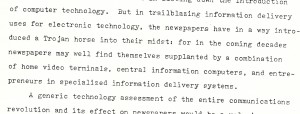For a project I’m working on (not MediaBugs but another effort in the media realm that’s a collaboration with Dan Gillmor and Bill Gannon):
We have some work for a designer who’s got lots of experience with Drupal to help us finish up a partially implemented design. This is a short-term gig that, we think, should be straightforward for someone who already knows Drupal well.
If you or someone you know might fit that bill, do be in touch with me at scottr /at/ this domain (wordyard.com). Thanks!

 I was cleaning out my garage recently, combing through some old files, and stumbled on a research paper I wrote in 1981 as a senior in college. The title was “The Electronic Newsroom and the Video Display Terminal.” I was writing about the moment that the digital transition rolled out from the back shop to engulf the newsroom, as — almost overnight — the typewriters were put out to pasture and a generation of journalists learned to love cut/paste and the “delete” key. What would that mean for the future of news?
I was cleaning out my garage recently, combing through some old files, and stumbled on a research paper I wrote in 1981 as a senior in college. The title was “The Electronic Newsroom and the Video Display Terminal.” I was writing about the moment that the digital transition rolled out from the back shop to engulf the newsroom, as — almost overnight — the typewriters were put out to pasture and a generation of journalists learned to love cut/paste and the “delete” key. What would that mean for the future of news?